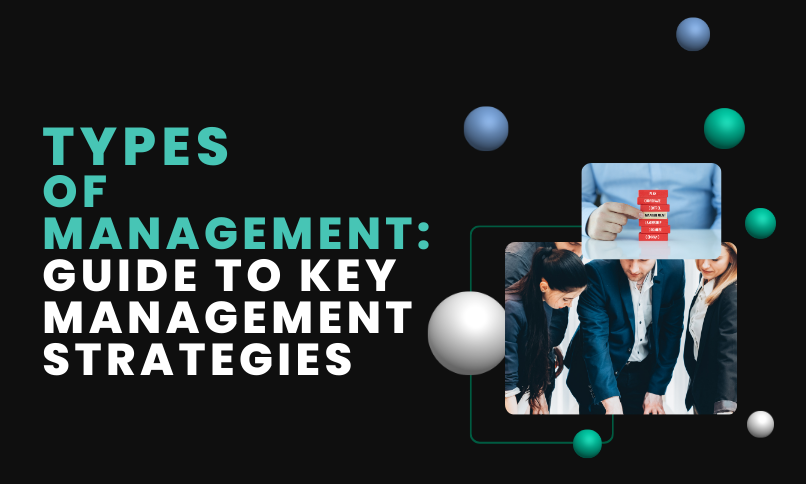Types of Management: Definition and Explanation
Management is the process of planning, organizing, leading, and controlling resources efficiently to achieve organizational goals. Various types of management exist, each catering to different aspects of business, administration, and operations. Below is a detailed discussion of different management types, their definitions, and explanations.
1. Strategic Management
Definition: Strategic management involves setting long-term goals, analyzing competitive environments, and making decisions to position the organization advantageously. Explanation: This type of management focuses on defining objectives, assessing resources, and formulating strategies to ensure long-term success. It helps organizations gain a competitive edge by identifying opportunities and threats and allocating resources efficiently.
2. Operational Management
Definition: Operational management focuses on optimizing the day-to-day processes and ensuring the effective execution of business functions. Explanation: It ensures that all operational processes run smoothly by managing resources, overseeing workflows, and maintaining efficiency. Operational managers are responsible for production, logistics, and supply chain management to enhance productivity.
3. Financial Management
Definition: Financial management involves planning, organizing, and controlling financial activities such as procurement, investment, and risk management. Explanation: This management type ensures that financial resources are utilized efficiently to achieve business objectives. It covers budgeting, forecasting, financial reporting, and decision-making related to investments, ensuring financial stability and growth.
4. Human Resource Management (HRM)
Definition: HRM involves managing people within an organization, including recruitment, training, employee relations, and performance management. Explanation: Human resource management ensures that an organization attracts, retains, and develops a talented workforce. It also focuses on maintaining employee motivation, workplace culture, and compliance with labor laws.
5. Marketing Management
Definition: Marketing management involves developing, implementing, and monitoring marketing strategies to promote products and services. Explanation: This type of management focuses on market research, branding, advertising, customer relationship management, and sales strategies. It ensures businesses reach their target audience effectively and maintain customer satisfaction.
6. Project Management
Definition: Project management is the process of planning, executing, and monitoring projects to achieve specific objectives within a defined timeframe and budget. Explanation: Project managers oversee tasks, resources, and risks to ensure project completion on time and within budget. They use methodologies like Agile, Scrum, and Waterfall to manage project lifecycles effectively.
7. IT Management
Definition: IT management involves overseeing information technology resources to support organizational goals and operations. Explanation: This type of management includes software development, network security, data management, and IT infrastructure planning. IT managers ensure that technology aligns with business needs and enhances efficiency.
8. Supply Chain Management
Definition: Supply chain management (SCM) involves coordinating the movement of goods, services, and information from suppliers to customers. Explanation: SCM ensures the efficient flow of materials, reduces costs, and improves customer satisfaction. It includes logistics, inventory management, and supplier relationship management.
9. Risk Management
Definition: Risk management involves identifying, assessing, and mitigating potential risks that could impact an organization. Explanation: Organizations use risk management to anticipate uncertainties, reduce vulnerabilities, and develop contingency plans. It covers financial risks, operational risks, and cybersecurity threats.
10. Quality Management
Definition: Quality management ensures that products and services meet established standards and customer expectations. Explanation: This management type includes quality assurance, control, and continuous improvement initiatives such as Six Sigma and Total Quality Management (TQM). It enhances efficiency, reduces defects, and maintains compliance with regulations.

11. Change Management
Definition: Change management focuses on guiding organizations through transitions and ensuring successful adaptation to new processes, technologies, or structures. Explanation: It involves communication, training, and stakeholder engagement to reduce resistance and facilitate smooth organizational change.
12. Customer Relationship Management (CRM)
Definition: CRM involves managing interactions with customers to enhance satisfaction, loyalty, and retention. Explanation: Businesses use CRM strategies to build strong relationships, personalize customer experiences, and improve service delivery. CRM software helps track customer interactions and preferences.
13. Knowledge Management
Definition: Knowledge management involves collecting, organizing, and sharing information to enhance organizational learning and decision-making. Explanation: This management type ensures that knowledge assets are preserved, updated, and utilized effectively. It includes data analytics, documentation, and collaboration tools.
14. Innovation Management
Definition: Innovation management involves fostering creativity and implementing new ideas to drive business growth. Explanation: Organizations focus on research and development (R&D), brainstorming, and experimentation to stay ahead of market trends. Innovation management helps businesses create unique products and services.
15. Time Management
Definition: Time management involves planning and allocating time efficiently to maximize productivity. Explanation: Effective time management helps individuals and organizations prioritize tasks, avoid procrastination, and meet deadlines. It includes goal setting, scheduling, and delegation.
16. Crisis Management
Definition: Crisis management involves responding to and mitigating the impact of unexpected emergencies or disruptions. Explanation: Organizations develop crisis management plans to handle situations such as natural disasters, cybersecurity breaches, and financial crises. It includes risk assessment, communication strategies, and recovery plans.
17. Facility Management
Definition: Facility management involves overseeing the maintenance and operations of physical infrastructure and work environments. Explanation: It ensures the safety, efficiency, and sustainability of buildings, equipment, and utilities. Facility managers handle security, space planning, and maintenance.
18. Healthcare Management
Definition: Healthcare management focuses on planning, organizing, and overseeing healthcare services and facilities. Explanation: It includes hospital administration, patient care coordination, medical record management, and regulatory compliance. Healthcare managers ensure quality services and efficient resource allocation.
19. Educational Management
Definition: Educational management involves planning and administering educational institutions and academic programs. Explanation: It covers curriculum development, faculty management, student affairs, and institutional governance. Educational managers ensure quality learning experiences and institutional success.
20. Environmental Management
Definition: Environmental management involves developing policies and practices to minimize ecological impact and promote sustainability. Explanation: Organizations use environmental management to comply with regulations, reduce waste, and implement green initiatives such as renewable energy adoption and carbon footprint reduction.
Conclusion
Management plays a crucial role in various aspects of business and society. Each type of management has unique objectives and processes that contribute to organizational success. Effective management ensures resource optimization, goal achievement, and continuous improvement in different domains.
